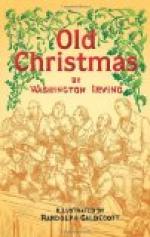In the course of a December tour in Yorkshire, I rode for a long distance in one of the public coaches, on the day preceding Christmas. The coach was crowded, both inside and out, with passengers, who, by their talk, seemed principally bound to the mansions of relations or friends to eat the Christmas dinner. It was loaded also with hampers of game, and baskets and boxes of delicacies; and hares hung dangling their long ears about the coachman’s box,—presents from distant friends for the impending feast. I had three fine rosy-cheeked schoolboys for my fellow passengers inside, full of the buxom health and manly spirit which I have observed in the children of this country. They were returning home for the holidays in high glee, and promising themselves a world of enjoyment. It was delightful to hear the gigantic plans of pleasure of the little rogues, and the impracticable feats they were to perform during their six weeks’ emancipation from the abhorred thraldom of book, birch, and pedagogue. They were full of anticipations of the meeting with the family and household, down to the very cat and dog; and of the joy they were to give their little sisters by the presents with which their pockets were crammed; but the meeting to which they seemed to look forward with the greatest impatience was with Bantam, which I found to be a pony, and, according to their talk, possessed of more virtues than any steed since the days of Bucephalus. How he could trot! how he could run! and then such leaps as he would take—there was not a hedge in the whole country that he could not clear.
They were under the particular guardianship of the coachman, to whom, whenever an opportunity presented, they addressed a host of questions, and pronounced him one of the best fellows in the whole world. Indeed, I could not but notice the more than ordinary air of bustle and importance of the coachman, who wore his hat a little on one side, and had a large bunch of Christmas greens stuck in the button-hole of his coat. He is always a personage full of mighty care and business, but he is particularly so during this season, having so many commissions to execute in consequence of the great interchange of presents.
And here, perhaps, it may not be unacceptable to my untravelled readers to have a sketch that may serve as a general representation of this very numerous and important class of functionaries who have a dress, a manner, a language, an air, peculiar to themselves, and prevalent throughout the fraternity; so that, wherever an English stage-coachman may be seen, he cannot be mistaken for one of any other craft or mystery.




